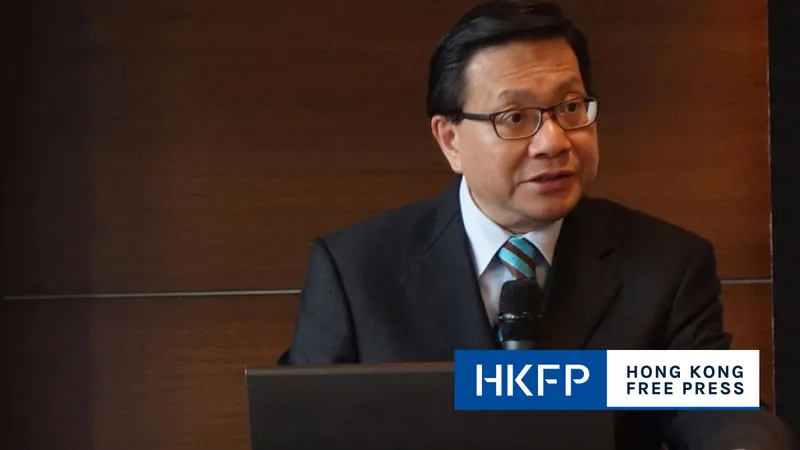
Is Hong Kong Ready for Open Debate and Demos to Restore its International Reputation?
2024-10-03
Author: Ying
Introduction
In a bold statement that has sparked discussions across various platforms, a former high-ranking official in Hong Kong suggests that the city must promote public debate and open demonstrations to regain its tarnished international image. This call comes in the wake of stringent security laws implemented in recent years, which many argue have stifled freedom and expression in the region.
Legislative Background
Hong Kong's recent legislative history has been marked by significant uproar—two major security laws were introduced: one imposed by Beijing in 2020 in response to widespread pro-democracy protests, and another passed earlier this year. Authorities have long defended these measures, insisting they are essential for 'restoring order' and leading Hong Kong from 'stability to prosperity.' However, critics contend that these laws have only deepened international concerns over human rights in the region.
Call for Constructive Discussion
In an interview with Ming Pao, former Secretary for Transport and Housing Anthony Cheung stressed the need for constructive discussions about the city’s economic transition. He believes that finding a 'critical point' to reverse negative perceptions held by other countries is crucial. 'It is vital for the government to demonstrate that public assembly can still be a part of our civic life,' Cheung asserted, recommending that the government support community gatherings as a sign of openness.
Legal Actions and Protests
Adding to the discourse, Cheung proposed the idea of dropping legal actions against over 6,000 individuals arrested during the 2019 protests, especially those without sufficient evidence against them. He clarified that this would not be an amnesty but rather a way to formally address the tumultuous events of the protests.
Roots of Unrest
The unrest of 2019 had its roots in a now-retracted extradition bill but escalated into broader calls for democracy, accountability for police actions, and concerns regarding Beijing's growing influence in Hong Kong. As protests became increasingly heated, the demand for an independent investigation into police misconduct, amnesty for demonstrators, and a recharacterization of protests from 'riots' to legitimate dissents echoed throughout the community.
Economic Transformation
Current Chief Executive John Lee stated that Hong Kong is at a significant crossroads in its economic transformation, reiterating the need to preserve its status as a leading global financial hub while seeking new areas of development. In light of this, Cheung emphasized that engaging the public in discussions about the future direction of economic reform could foster a sense of consensus among citizens.
Maintaining International Relations
Cheung further advised against severing ties with Western countries like the United States and European nations, asserting that, as Hong Kong onboards emerging markets, maintaining relationships with traditional allies is equally important.
Geopolitical Tensions
Adding to the governmental challenges, Cheung remarked on the mounting anxiety felt by officials due to geopolitical tensions, particularly concerning international pressure from the U.S. This has caused a defensive posture regarding national security, with government officials often rebutting criticisms made in local and international media.
Countering Misleading Information
For instance, the Hong Kong Security Chief, Chris Tang, has actively sought to counter what he labeled as 'misleading information' about government policies, including the contentious Safeguarding National Security Ordinance, which has been criticized for its vague parameters and potential human rights violations.
Conclusion
As the world watches Hong Kong's next steps, the question remains: Will the government embrace an approach that prioritizes dialogue and transparency, or will it continue down a path of resistance? The future of Hong Kong’s engagement, both domestically and internationally, hangs in the balance as citizens call for a revival of open debate and the right to protest.
 Brasil (PT)
Brasil (PT)
 Canada (EN)
Canada (EN)
 Chile (ES)
Chile (ES)
 España (ES)
España (ES)
 France (FR)
France (FR)
 Hong Kong (EN)
Hong Kong (EN)
 Italia (IT)
Italia (IT)
 日本 (JA)
日本 (JA)
 Magyarország (HU)
Magyarország (HU)
 Norge (NO)
Norge (NO)
 Polska (PL)
Polska (PL)
 Schweiz (DE)
Schweiz (DE)
 Singapore (EN)
Singapore (EN)
 Sverige (SV)
Sverige (SV)
 Suomi (FI)
Suomi (FI)
 Türkiye (TR)
Türkiye (TR)